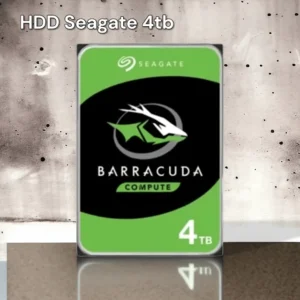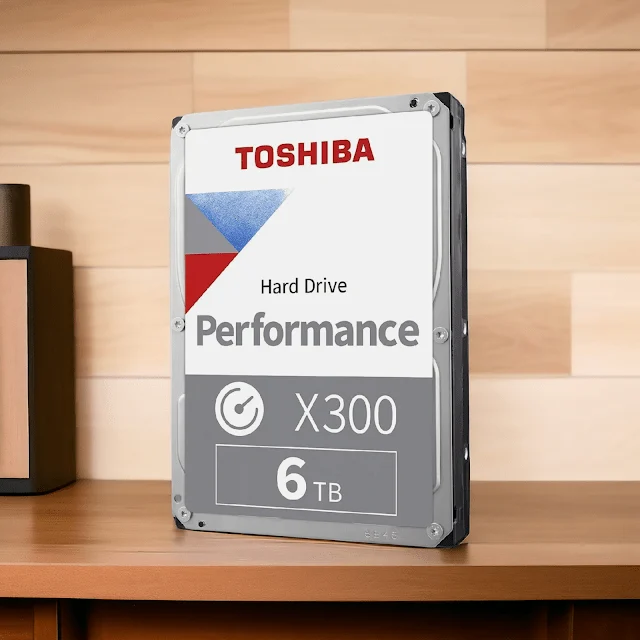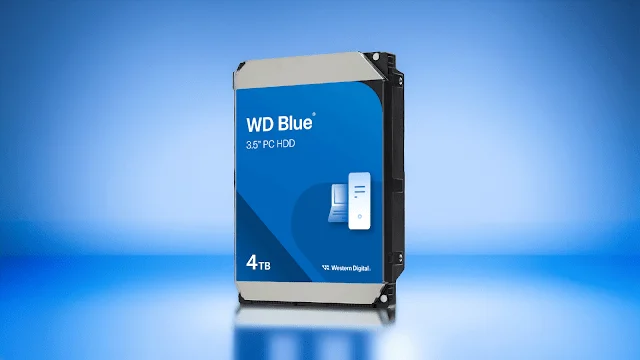
✅ Types of HDDs and their best use cases
✅ Comparison of top HDD brands and their countries of manufacture
✅ Key technical aspects: cache memory, RPM, latency, and durability
✅ High-capacity HDDs (16TB+) vs. smaller HDDs (4TB-8TB)
✅ Professional recommendations based on performance and reliability
By the end of this article, you’ll know exactly which HDD suits your needs.
📌 Types of HDDs and Their Best Use Cases
1. Gaming HDDs 🎮
- Best For: High-performance gaming PCs.
- Features & Benefits: Faster RPM, high cache memory.
2. Enterprise HDDs 🏢
- Best For: Servers, data centers.
- Features & Benefits: High durability, long lifespan.
3. NAS HDDs 📁
- Best For: Network storage (RAID setups).
- Features & Benefits: Optimized for 24/7 operation.
4. Surveillance HDDs 📹
- Best For: Security camera systems.
- Features & Benefits: Handles continuous video recording.
5. Consumer HDDs 🏠
- Best For: Everyday use, backups.
- Features & Benefits: Budget-friendly, good for storage.
💡 Choosing the right HDD depends on your specific needs. If you need fast performance, opt for gaming or enterprise HDDs. For reliable long-term storage, NAS and surveillance drives are ideal.
🏆 Top HDD Brands and Their Best Models
🔥 Top Storage Brands: Best Picks for NAS, Gaming, Enterprise & More! 🔥
Looking for the best storage solutions for your NAS, gaming, or enterprise needs? Check out this ultimate comparison of the top storage brands and their flagship models! Whether you’re a gamer, a data hoarder, or a business professional, this guide will help you choose the perfect storage solution. Let’s dive in! 💾
1. Seagate 🏴 (USA)
- 🌟 Best For: NAS, Enterprise, Gaming
- 🚀 Top Models:
- 🔹 IronWolf: Perfect for NAS systems with high reliability and performance.
- 🔹 Exos: Built for enterprise workloads with massive capacity and durability.
- 🔹 BarraCuda: Ideal for consumer use with affordable pricing and solid performance.
- Why Choose Seagate? A trusted brand for diverse storage needs!
2. Western Digital (WD) 🏴 (USA)
- 🌟 Best For: Gaming, Surveillance, Enterprise
- 🚀 Top Models:
- 🔹 WD Black: Designed for gamers with high-speed performance.
- 🔹 WD Red: Optimized for NAS systems with efficient power usage.
- 🔹 WD Purple: Tailored for surveillance systems with 24/7 reliability.
- Why Choose WD? A versatile brand with specialized drives for every use case!
3. Toshiba 🇯🇵 (Japan)
- 🌟 Best For: Workstations, Enterprise
- 🚀 Top Models:
- 🔹 X300: Great for gaming and high-performance workstations.
- 🔹 N300: Built for NAS systems with enhanced durability.
- 🔹 MG Series: Designed for enterprise storage with high capacity and reliability.
- Why Choose Toshiba? A reliable brand for professional-grade storage solutions!
Which Brand Should You Choose? 🤔
- 🏴 Seagate: Best for NAS and enterprise storage.
- 🏴 Western Digital: Perfect for gaming, surveillance, and NAS.
- 🇯🇵 Toshiba: Ideal for workstations and enterprise needs.
⚙️ Technical Breakdown: How HDDs Work
HDDs store data on spinning magnetic platters, accessed by a mechanical arm with read/write heads. Performance depends on several key factors:
Key Factors to Consider When Choosing an HDD 💽
1. RPM (Rotational Speed) 🔄
- Description: Measures how fast platters spin. Higher RPM = faster data access.
- Best Option: 7,200 RPM is ideal for speed & reliability.
2. Cache Memory (Buffer) 📊
- Description: Temporarily stores frequently accessed data. More cache = better performance.
- Best Option: 128MB+ for best results.
3. Latency ⌛
- Description: Time taken to access requested data. Lower latency = faster performance.
- Best Option: Higher RPM + larger cache = lower latency.
Why These Factors Matter
When choosing an HDD, understanding RPM, cache memory, and latency is essential for optimizing performance. Whether you’re building a gaming PC, setting up a NAS system, or simply upgrading your storage, these factors ensure you get the best speed and reliability for your needs.
💾 HDD vs. ⚡ SSD: Which is Better?
HDD vs. SSD Comparison 💽
Speed 🚀
- HDD: Slower (100-200 MB/s)
- SSD: 5-10x faster (500+ MB/s)
Durability 🛡️
- HDD: Mechanical parts (can fail over time)
- SSD: No moving parts (more durable and shock-resistant)
Storage Capacity 📦
- HDD: Up to 20TB+ (ideal for large storage needs)
- SSD: Usually 4TB max (consumer-level, but sufficient for most users)
Price 💰
- HDD: More affordable per TB (budget-friendly for bulk storage)
- SSD: More expensive per TB (premium performance at a higher cost)
Key Takeaways:
- Choose HDD if: You need large storage capacity on a budget and don’t mind slower speeds.
- Choose SSD if: You want faster performance, durability, and are willing to pay a premium.
✔ For OS and apps → Choose an SSD
✔ For large storage → Choose an HDD
🔥 Large HDDs vs. Smaller HDDs: Which One Should You Choose? 🔥
Trying to decide between large HDDs (16TB+) and smaller HDDs (4TB-8TB)? This ultimate comparison breaks down the key factors like power consumption, heat generation, failure risk, and best use cases to help you make the right choice! Whether you’re a data hoarder, a gamer, or a business professional, this guide has you covered. Let’s dive in! 💾
1. Power Consumption 🔋
- Large HDDs (16TB+): Higher power usage due to larger capacity and higher performance.
- Smaller HDDs (4TB-8TB): Lower power usage, making them more energy-efficient.
- Why It Matters: Choose smaller HDDs for energy savings or large HDDs for massive storage needs.
2. Heat Generation 🌡
- Large HDDs (16TB+): Generate more heat due to higher workloads and larger platters.
- Smaller HDDs (4TB-8TB): Produce less heat, ideal for smaller setups or low-ventilation environments.
- Why It Matters: Smaller HDDs are better for compact systems, while large HDDs need proper cooling.
3. Failure Risk ❗
- Large HDDs (16TB+): Increased risk due to higher complexity and more moving parts.
- Smaller HDDs (4TB-8TB): Lower risk, offering better reliability for everyday use.
- Why It Matters: Smaller HDDs are safer for critical data, while large HDDs need regular backups.
4. Best Use Cases ✅
- Large HDDs (16TB+):
- Enterprise storage
- Cloud storage solutions
- Large-scale backups
- Smaller HDDs (4TB-8TB):
- Personal use (documents, photos, videos)
- Gaming libraries
- NAS systems for home or small offices
- Why It Matters: Match your storage needs with the right HDD size for optimal performance.
Which One Should You Choose? 🤔
- Large HDDs (16TB+): Perfect for enterprise or massive data storage needs.
- Smaller HDDs (4TB-8TB): Ideal for personal use, gaming, or small NAS setups.
💡 For personal use and gaming, smaller HDDs (4TB-8TB) are more efficient. For business and cloud storage, larger HDDs (16TB+) are better.
Recommended HDDs for Different Use Cases 💽
1. Gaming 🎮
- Recommended HDD: WD Black / Seagate FireCuda.
2. NAS Storage 📁
- Recommended HDD: Seagate IronWolf / WD Red / Toshiba N300.
3. Enterprise Servers 🏢
- Recommended HDD: Seagate Exos / Toshiba MG Series.
4. Surveillance Systems 📹
- Recommended HDD: WD Purple / Seagate SkyHawk.
5. Budget Consumer Use 💰
- Recommended HDD: Seagate BarraCuda / Toshiba X300.
Why These Recommendations Matter
Choosing the right HDD for your specific use case ensures optimal performance, reliability, and longevity. Whether you’re a gamer, managing a NAS system, running enterprise servers, securing your property with surveillance systems, or simply looking for budget-friendly storage, these recommendations help you make the best choice.
🔥 Final Advice: How to Make the Smartest Storage Choice
✔ Need fast speed? → Get an SSD
✔ Need massive storage? → Go for an HDD
✔ Best setup? → SSD for OS, HDD for storage
✔ Want long-term reliability? → Always use RAID backups
💡 Choosing the right HDD depends on balancing speed, capacity, and reliability!










